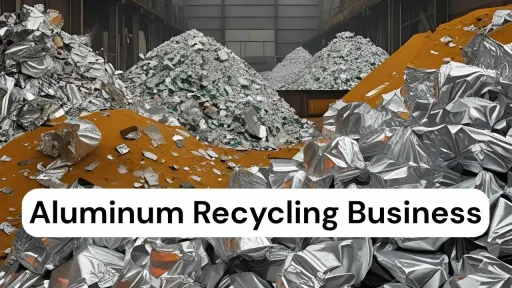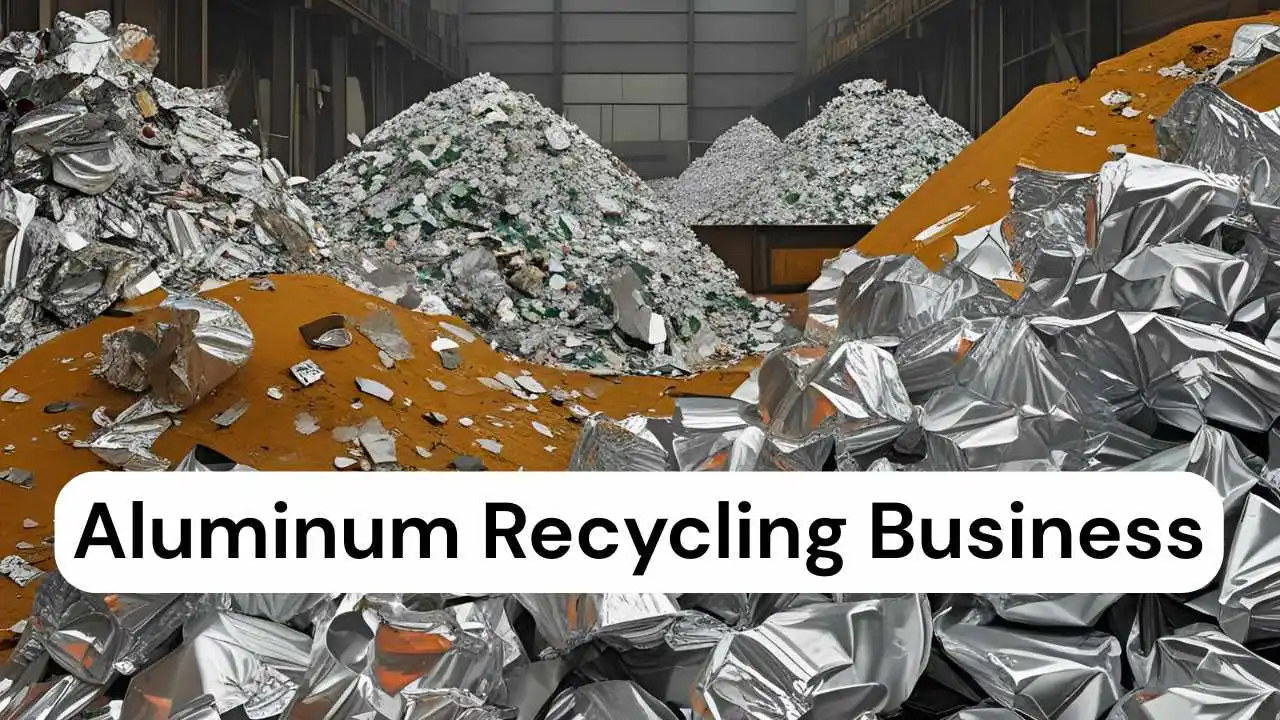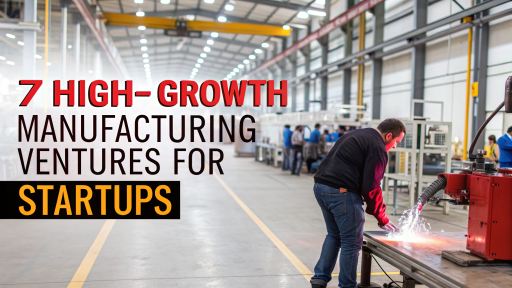Aluminum is among the most recyclable substances on Earth. The quality of aluminum does not change when it is recycled. Recycling only uses 5% of energy required to produce new aluminum. Aluminum recycling is more important than ever as the world strives to be sustainable.
Entrepreneurs who are looking to earn a profit and help the environment can benefit from starting an aluminum recycling company. This is a business you can start small and expand as your company grows. Like any other business, planning, knowledge, and investment are required.
This guide will take you step-by-step through the process of setting up an aluminum recycling business, from understanding the basics to setting your facility up and selling your recycled goods.
Understanding Aluminum Recycling Business: Know Whole Process Step By Step
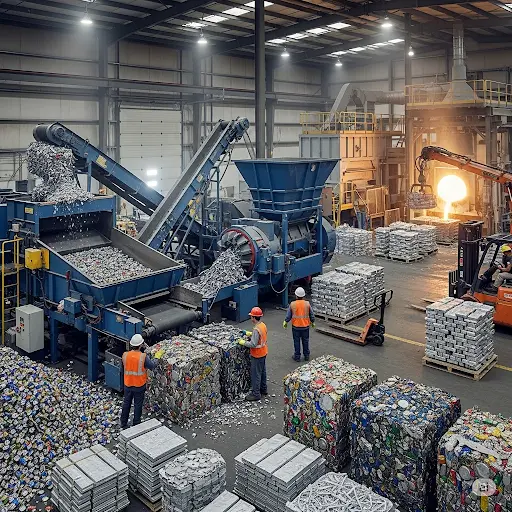
Step 1: Understanding the Business
You need to know how the aluminum recycling process works before you start.
Why aluminum recycling is important
- Recycling aluminum reduces energy consumption, greenhouse gas emissions, and mining
- Aluminum is in high demand in many industries, including automotive, construction and packaging
Common sources of aluminum scrap
- Cans of used beverage (UBCs).
- Frames for windows and doors
- Vehicle Parts
- Electric wires and cables
- Kitchen utensils, foil and other kitchen utensils
- Industrial scraps
Final Products
Manufacturers typically buy recycled aluminum in the form ingots or billets.
Step 2: Develop a Business Plan
A well-structured plan of business is the foundation for any successful business. Included in the plan should be:
- Business model: Do you plan to collect and process aluminum yourself or will you buy it from dealers
- Market research: Research the market to find out who needs recycled aluminum in your region or country
- Startup Cost: Calculate your startup costs, including the cost of land and equipment, as well as labor, utilities and licenses
- Revenue model: Decide how you plan to make money: by selling aluminum processed, renting machines, or offering recycling services
- Break-even analysis: Calculate the time it will take for you to recover your initial investments
A clear plan can help you to stay on track, and will attract investors or loan opportunities.
Step 3: Legal requirements and licensing
Legal compliance is important for recycling businesses that deal with chemicals, waste and emissions.
You may need the following licenses:
- Registration of businesses
- Environmental clearance (Local pollution control board provides)
- License for a factory or workshop
- Fire Safety Certificate
- Municipal authorities can issue a trade license
- GST registration (in countries like India)
- Waste management approval
Tip: Consult with a small business development center or local legal advisor to ensure that you are in compliance with all state and local regulations.
Related Article: Aluminum Ingots from Scrap: Profitable Business with Market Insights
Step 4: Select a suitable location
The location of your business is crucial to its efficiency. Choose a location that:
- Avoid residential areas to avoid complaints about noise or pollution
- Aluminum scrap sources are close by
- Transport routes accessible
- Zoned for commercial or industrial use
You’ll also need room for:
- Storage of scrap
- Sorting and Processing Area
- Machine and furnace set-up
- Waste disposal area
- Office space and administrative space
Step 5: Purchase the Right Equipment
You will need to invest in equipment when you set up an aluminum recycling facility. Your scale of operation will determine the type and number machines you need.
Basic Equipment Required:
- Conveyor Belts: to move scrap around the facility
- Sorting equipment: To separate aluminum from other metals
- Aluminum Shredder: To reduce the size
- Sort non-ferrous metals: Such as aluminum with an eddy current separator
- Furnace (gas or electrical): used to melt aluminum
- Casting molds: Used to transform molten aluminum into ingots
Read our book: The Complete Technology Book on Aluminium and Aluminium Products
Weighing machines
- Pollution control systems: Such as fume extractors or filters
- Safety equipment: goggles, gloves, helmets
- Estimated cost: A small unit might cost between $30,000 and $100,000, whereas a large or medium-sized unit could exceed $300,000
Step 6: Hire Skilled Labor
Recycling aluminum requires operating machines, handling metals and managing heat and flame. You’ll also need to hire a team of experts who understand safety protocols and machine operation.
The typical staff includes:
- Machine operators
- Sorters and Loaders
- Staff for quality control
- Maintenance Technician
- Supervisor/manager
- Accounting or admin staff
Provide workers with safety training to ensure they follow the best practices.
Want to choose best business Idea for your budget?
You can use our Startup Selector Tool to find best business project for yourself
Step 7: Source Aluminum Scrap
Your business will not run without a constant supply of scrap. Create a network that includes:
- Local scrap dealers
- Municipal waste collection centers
- Construction and demolition sites
- Warehouses or factories
- Families and institutions
- Buyback or exchange programs
Encourage a steady supply by offering competitive rates and fast payments.
Know about our popular ‘Aluminium and Aluminium Extrusion Profiles & Sections‘ report
Step 8: Begin the recycling process
Here’s an overview of the process once you’ve got your set-up ready:
Aluminum Scrap from Your Sources:
- Sorting: Separate the aluminum waste from other metals
- Cleaning: Remove any dirt, paint or plastic
- Shredding: Breaking large pieces into smaller pieces
- Melting: Place the aluminum in the furnace
- Purifying: Use filters or chemicals to remove any remaining impurities
- Casting: Pour aluminum molten into molds to create ingots
After cooling, store or ship the ingots.
Step 9: Sell Recycled Aluminum
You can sell your aluminum recycled ingots or billets to:
- Aluminum Product Manufacturers
- Manufacturers of auto parts
- Construction companies
- Packaging companies
- Foundries
- Export markets
Selling Successfully Tips:
- Ensure consistent quality
- Offer competitive prices
- Build long-term agreements
- Highlight your green/environmental contribution
Step 10: Continue to Improve
Staying competitive is important:
- Watch global Aluminum Prices
- Upgrade your technology
- Increase your network of suppliers
- Diversify your business into recyclables such as copper, brass or other metals
- Update your environmental laws and regulations
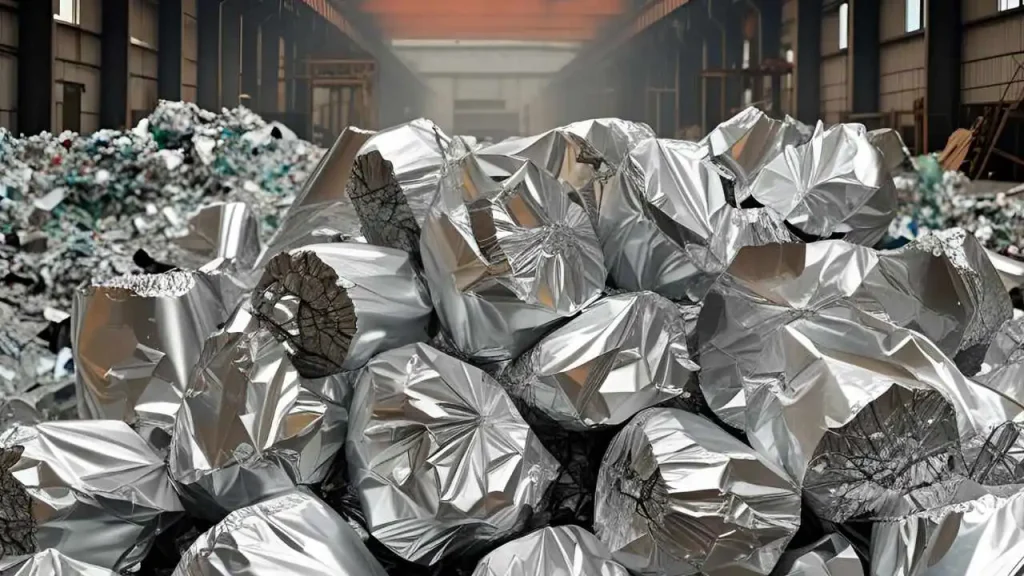
Conclusion
It is smart to start an aluminum recycling company. This will not only help you earn money, but it also helps protect the environment. This business is a long-term investment as more industries are requesting recycled materials, and the government pushes for greener practices.
The setup is complicated and requires machinery and compliance with the law. However, the return can be significant. You can create a profitable business by following the above steps, maintaining quality and staying organized.
Aluminum Recycling Business: Frequently Answered Questions (FAQs)
Q1. What is the cost of starting an aluminum recycling business?
A: A small plant can cost between $30,000 and $100,000 depending on location, equipment and labor costs. A larger setup may cost up to $300,000.
Q2. Aluminum recycling is it profitable?
A: Yes, it is possible to be profitable. Recycling aluminum is in high demand across many industries, and it requires less energy for production. This reduces costs.
Q3. What are the main challenges of aluminum recycling?
- Investments with high initial cost
- Get regular supplies of clean scrap
- Environmental and safety regulations
- Quality and Impurities in Scrap
Q4. Do I require a special license or permit to enter the country?
A: Depending on where you live, you might need:
- Registration of businesses
- Environmental clearances
- Waste management licenses
- Certifications for pollution control
Q5. What are the best ways to find buyers of recycled aluminum?
A: You can approach:
- Local manufacturers
- Construction and auto companies
- Metal wholesalers
- Exporters
- Online B2B Marketplaces
Q6. Can I start at home or in a small shop?
A: Start small but make sure you have enough space to sort, melt, and use safety equipment. Recycling at home may not comply with environmental and legal regulations.

